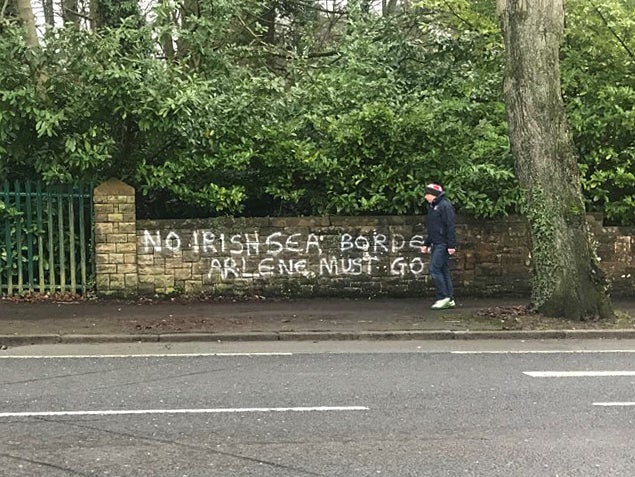Discontent ‘growing’ among loyalists over Northern Ireland protocol, police chief warns
End of lockdown could see unionist protests, police officer says

Your support helps us to tell the story
From reproductive rights to climate change to Big Tech, The Independent is on the ground when the story is developing. Whether it's investigating the financials of Elon Musk's pro-Trump PAC or producing our latest documentary, 'The A Word', which shines a light on the American women fighting for reproductive rights, we know how important it is to parse out the facts from the messaging.
At such a critical moment in US history, we need reporters on the ground. Your donation allows us to keep sending journalists to speak to both sides of the story.
The Independent is trusted by Americans across the entire political spectrum. And unlike many other quality news outlets, we choose not to lock Americans out of our reporting and analysis with paywalls. We believe quality journalism should be available to everyone, paid for by those who can afford it.
Your support makes all the difference.Discontent is “growing” in loyalist communities over the Northern Ireland protocol, a senior police officer has said, pointing to signs that anger is rising over trade disruption.
Graffiti and social media posts has been identified as early indicators of dissatisfaction, but feedback is not causing the force significant concern, the Police Service of Northern Ireland (PSNI) said.
Assistant Chief Constable Mark McEwan said: "We are seeing signals, there are signal incidents that have happened, particularly in recent days.
"We are starting to see graffiti, we are picking up social media sentiment of a growing discontent, particularly within the Protestant/loyalist/unionist community. That has not manifested itself in any out workings at this point."
However, the force is preparing for a rise in demonstrations over trade disruptions once the lockdown restrictions ease.
The Northern Ireland protocol meant that a hard border was avoiding on the island of Ireland, with a regulatory border instead created in the Irish Sea between Northern Ireland and the rest of the United Kingdom.
Large suppliers and supermarkets have been given a three-month grace period until 31 March to adjust to the new regulations.
Mr McEwan warned that unless a solution is found by the end of the period, some goods may become more expensive in Northern Ireland, or even become unavailable.
Earlier this month, major UK supermarkets warned the government that “urgent intervention” is needed to prevent significant disruption to Northern Ireland food supplies, calling on them to agree to a long-term solution with the EU before the end of the grace period.
The senior police officer told the Northern Ireland Affairs Committee of MPs: "That will focus people's minds, I believe, in terms of how Northern Ireland looks and feels for certain members of our community."
He added: "If we get to the point where we don't have such stringent restrictions, where people are not as worried about the health crisis, we may see that manifest in the likes of protests, and we are prepared for that."
He said the force is monitoring the unionist community, though intelligence has not caused serious concern so far.
"Were we not in this current environment around the pandemic we would probably see a more visible outworking of that on the streets of Northern Ireland," he added.



Join our commenting forum
Join thought-provoking conversations, follow other Independent readers and see their replies
Comments